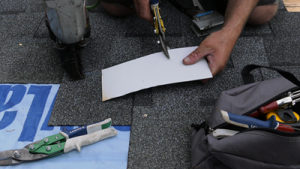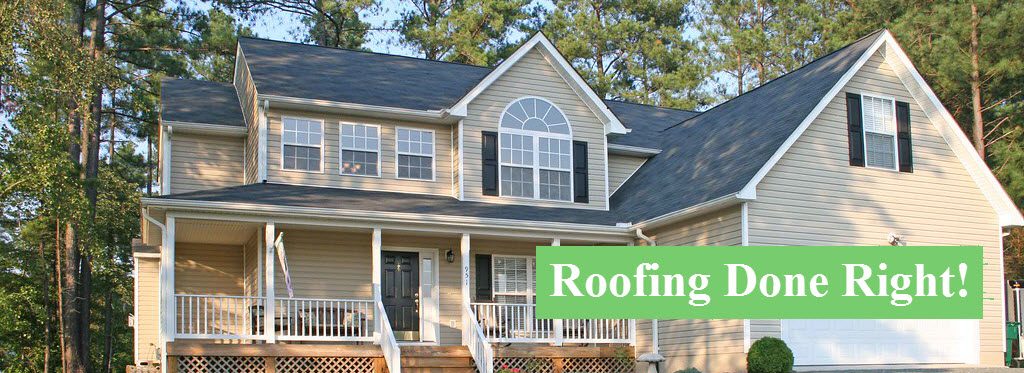Most companies that make roofing shingles will offer warranties that range from about 20 years up to 50 years. They utilize impressive-sounding long-term warranties to persuade buyers that their roof shingles are the best available and also that they will last the longest. They will talk about the shingles algae resistance, wind tolerance, and also whether the guarantee can be transferred when you sell your home to a new person. This last item can add value to the home when you go to sell it. These guarantees are usually one of shingle producers’ main selling points.
You shouldn’t allow yourself to be swayed by a warranty that sounds way too good to be real. Also asphalt roof shingle manufacturing companies that offer decades-long warranties or lifetime guarantees don’t anticipate your roofing to last longer than about twenty years. According to many roofers, service warranties “aren’t worth a nickle” if the company that offers it isn’t around 10 years later when you need them.
When Your Roof Leaks
The majority of roofing systems that stop working throughout the service warranty period do so due to the fact that they were installed incorrectly. Roof shingle manufacturers like Certainteed and GAF often get phone calls from homeowners whose roof coverings (usually asphalt shingles) stopped working due to the fact that the installation was done with nails rather than the method advised by the manufacturer like using screws in a high-wind area. Given that the contractor is most likely to cause an issue rather than the shingle actually being the issue, you should make sure your roof is put on by a reputable local contractor who has been around long enough to establish a good reputation. .
Product Manufacturer Issues vs. Roofing Contractor Errors
Shingle manufacturers will only pay the homeowner when the roof shingles are found to have a defect that can be traced back to actual shingle issues as opposed to roof installation errors. Most roofers will never see a product defect that will require the manufacturer to pay out a warranty claim. Most products that are used today are of good quality and the chance of a defect that will cause the roofing system to fail is extremely rare. Shingle companies must compete against each other and that drives them to produce top-quality products that help ensure no warranty claims will ever need to be addressed. Even if you are among the rare home owners whose roofing system stops working due to malfunctioning shingles, obtaining reimbursement for the actual product won’t alleviate the cost of labor to repair your roofing system. The roof shingles are not the most expensive part of any type of roofing system or roof covering. Labor is by far the biggest cost of roofing and therefore it is more important that you choose a good roofing contractor. The actual shingles will only make up about fifteen to twenty percent of the cost of a repair. There are other materials such as nails, screws, underlayment, sheathing and possibly membrane materials, plumbing boots and flashing that will make up some of the costs. A warranty that covers replacement shingles, yet not labor, may represent only a few hundred dollars of the thousands required to repair or completely replace your roofing system.
Some Hurdles You May Have To Overcome
Although your shingles might be covered by a 30 or 40-year service warranty, the majority of these lasting service warranties are prorated after the first couple of years. They may cover one hundred percent of the replacement expense of malfunctioning shingles for 5 or 10 years. But afterwards, several warranties cover only a diminishing percentage of the cost. We have listened to numerous roofing contractors state that the warranty will cover less and less as the roof ages. This is something you should be aware of. They will not cover the full cost of repair or replacement in year 10!
The claims process itself can be another obstacle to a successful shingle guarantee claim. Each shingle manufacturing firm has a different system for assessing and handling warranty claims. Some companies, such as GAF will send a firm representative out to evaluate your roofing system. Even if the roofing system stopped working because of an installation error and also not because of a production defect, they will certainly help property owners work with their installers to deal with the scenario because they want the roofers who install their products to have some responsibility. If the roofing contractor is no longer in business, some manufacturers will be willing to share a portion of the cost to repair the roof with the homeowner.
Although some companies are very good about helping homeowners to resolve the issues with their roof, others may be less accommodating. One of the major manufacturers who is not a US based company, is not as customer-friendly. The homeowner can call the firm or file an insurance claim and hope that the insurance company will do battle with the shingle manufacturer. The insurance claims person may contact the manufacturer with a list of product complaints, including pictures of the faulty shingles, survey notes and possibly a physical sample of the damaged shingles.
How To Determine If Your Roof Shingles Are Actually Defective
 So, since you’re now doubtful when it comes to roof shingle warranties, how do you figure out whether the issue of a leaking roof is brought on by faulty shingles? A lot of the most common production defects can be identified by an untrained eye. Despite typical wear-and-tear, your roofing system will not look like new for very long. This doesn’t mean you have actually been duped or that you’ve been sold an inferior shingle. Often you can identify issues that are abvious such as shingles that are blistering, splitting or fracturing. This may mean that they are defective but the issue could also be how they were installed. Small amounts of curling at the edges is often present even in regular, correctly made shingles. However considerable curling may be an indicator of trouble. Bald spots, where the granules outside of the shingle are exfoliating and exposing the asphalt is another tell-tale sign of a failing shingle. Discoloration might be triggered by algae development which will often occur on the north side of a roof where is doesn’t receive much sunlight. Not all roof shingles are ensured against algae growth damage so you should thoroughly read the fine print to find out if your shingles are supposed to be warranted against algae growth.
So, since you’re now doubtful when it comes to roof shingle warranties, how do you figure out whether the issue of a leaking roof is brought on by faulty shingles? A lot of the most common production defects can be identified by an untrained eye. Despite typical wear-and-tear, your roofing system will not look like new for very long. This doesn’t mean you have actually been duped or that you’ve been sold an inferior shingle. Often you can identify issues that are abvious such as shingles that are blistering, splitting or fracturing. This may mean that they are defective but the issue could also be how they were installed. Small amounts of curling at the edges is often present even in regular, correctly made shingles. However considerable curling may be an indicator of trouble. Bald spots, where the granules outside of the shingle are exfoliating and exposing the asphalt is another tell-tale sign of a failing shingle. Discoloration might be triggered by algae development which will often occur on the north side of a roof where is doesn’t receive much sunlight. Not all roof shingles are ensured against algae growth damage so you should thoroughly read the fine print to find out if your shingles are supposed to be warranted against algae growth.
Different Shingles Carry Different Warranties
Also within one company, warranties can vary from one shingle to the next. For example, CertainTeed makes thirty-seven various roof shingles, each with a various guarantee. Some cover materials as well as labor, while a few of their limited warranties do not even cover substitute shingles. Unless the shingle service warranty covers labor as well as products, the cash you receive from the business might not also cover the cost of paying a person to climb up on your roofing to take images and also collect examples of your faulty roof shingles. CertainTeed supplies claimants $50 to defray the expense of submitting an insurance claim, whether the case is successful or not. But other companies do not reimburse homeowners for these costs.
Transferring the Guarantee to a New Owner When You Sell Your Home
If you were the homeowner who had a new shingled roof installed, check the details of the warranty. Many roofers will not allow the warranty to transfer to a new homeowner. Unless you have something in writing that guarantees and allows for a transfer of the warranty, you might be out of luck. Roof shingle guarantees are generally more likely to be transferable than contractor labor assurances. It is a rare roofer who will allow a labor warranty to transfer when you sell your home to a new buyer.
If you acquire a home after the roof installation took place you should inquire prior to closing require to identify whether the original warranty is transferable. Some manufactures of shingle and other roofing products such as Decra, will allow you to move the warranties to the buyers of your home. Companies like CertainTeed have “limited transfer-ability,” which implies it depends on which line of shingles were installed on your roof. Their expanded guarantees are not transferable.
At the minimum, when getting a home with a newer roofing system, you need to ask the seller for the name of the roofer who did the installment, the type of shingles utilized, as well as the date of installation. This is very important information to have and most home buyers fail to ask for this. But even if the previous owner is long gone, you may still be able to figure out what type of shingles you have. You can take an example shingle to a distributor of asphalt shingles who should be able to tell you what the actual shingle is including the name of the manufacturer. Most shingles likewise have codes on the back that tell individuals who work in the market which firm made the shingle, which plant the shingles came from, as well as the year of manufacture.
If you can not locate a supplier or wise roofer to aid you in finding the codes, some manufacturers will be able to help even if the shingle is not theirs. Certainteed has a service department who will certainly help identify a shingle. Their lab technicians make use of the codes to tell whether the roof shingles were made by them or another shingle manufacturer.
In Closing
Hopefully the information in this article will help you to understand roofing system warranties and what you should look for when assessing them. You be far better off knowing what may be worth paying extra for and what may be just a bunch of fluff to get you to pay more for the shingle and total roofing system. It may be worth paying more for a roofing professional who provides a good, long-term warranty including labor warranty that will cover any issues that may arise during the next 10 to 20 years. Having a roof warranty that is transferable may make your house extra eye-catching and more appealing to possible buyer making it easier to sell your home.

